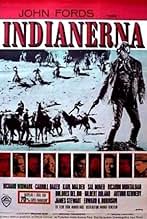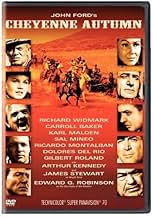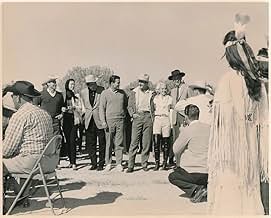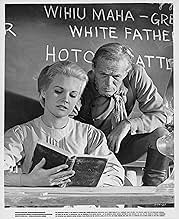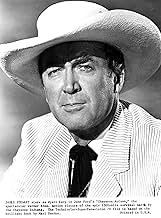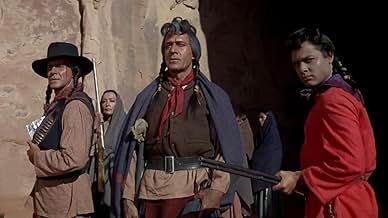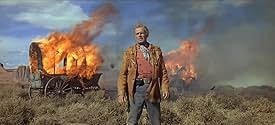Los Cheyenne, cansados de las promesas incumplidas del gobierno de los Estados Unidos, se dirigen a sus tierras ancestrales, pero un oficial de caballería comprensivo tiene la tarea de lleva... Leer todoLos Cheyenne, cansados de las promesas incumplidas del gobierno de los Estados Unidos, se dirigen a sus tierras ancestrales, pero un oficial de caballería comprensivo tiene la tarea de llevarlos de regreso a su reserva.Los Cheyenne, cansados de las promesas incumplidas del gobierno de los Estados Unidos, se dirigen a sus tierras ancestrales, pero un oficial de caballería comprensivo tiene la tarea de llevarlos de regreso a su reserva.
- Dirección
- Guionistas
- Elenco
- Nominado a 1 premio Óscar
- 1 premio ganado y 3 nominaciones en total
- Spanish Woman
- (as Dolores Del Rio)
- Guinevere Plantagenet
- (as Betty Ellen)
- Dirección
- Guionistas
- Todo el elenco y el equipo
- Producción, taquilla y más en IMDbPro
Opiniones destacadas
Compared with other western movies, the main difference and innovation is that here any killed man is a REAL tragedy, that exhaustion, famine, cold, violence are REAL sufferings for the miserable people on the screen (not just for the Cheyennes, even for the whites). And all that is shown us by Ford ruthlessly, uncompromisingly. The fact that the director stands for the Indians is not as much innovative as it seems. All along his career Ford showed respect and sympathy for them. In the finale, just after an apparent happy ending, we have again violence, again a murder, again a distressed mother: we almost feel the same grief of hers. It is somewhat ironic that in the same year the film was made, 1964, the fashion of Italian western movies invaded the world of cinema, with furious, acrobatic gun-fights and hundreds of shot-dead people, like in a sort of funny game.
The movie is split into two parts by a comic interlude, the episode placed in Dodge City, which is actually a farce. I think that Ford wanted to pay a homage and bid his personal farewell to the old silent western-movies of the 1920s, when his career started. The funny situations are deliberately over the top: see the sensational, licentious joke, when Wyatt Earp (Jimmy Stewart) realizes that he actually had met the girl in Wichita... In any case, a somewhat gloomy mood permeates even this comic part. The main characters are all aged, grey-haired and seemingly life-weary. And the episode is introduced by a particularly brutal, cruel murder.
I think that "Cheyenne Autumn" is a beautiful film, with a good story, great visual beauties, and, in particular, an excellent acting by the whole cast. But it is tough for me to face John Ford's desperate vision. After all, what I most like in the movie is to see, once again, Ben Johnson and Harry Carey Jr on horse-back, in their blue uniforms (by the way: why are they uncredited?). They are both aged and bulkier compared with their look in the great Ford's western-epics of their youth. Never mind: they are almost dearer to me for this very reason...
My own take on that is the otherwise surprising absence of John Ford's customary over-reliance on sentimentality in this particular enterprise. At the very least when he made a movie with a setting in the Old West, he usually insisted upon using folk songs, sometimes ad nauseum, as background (and foreground) musical accompaniment, but here the very sophisticated Alex North is credited with the musical score, and its bitter strains are not at all typical of a John Ford production. I do not know if Mr. North was assigned to this project against Mr. Ford's preference, but that noted composer's contribution (He was nominated fourteen times for an Academy Award, though not for this one.) is one of his best and most appropriate accomplishments, to my ears. Except for his uncredited work on "Young Cassidy" and the truly atypical "Seven Women" starring Anne Bancroft which followed this major screen opus, John Ford made a final bow here that may not be his best but which unquestionably bears the mark of a master of the cinema.
This starts off well with the vast landscape and compelling story of the Cheyenne mistreatment. Director John Ford is able to give dignity to the movie. Even with the mostly Latinos portraying Cheyennes, it isn't that badly done. There is some good action. It's set up for a serious compelling western. It is a somewhat long march. It's meandering and struggles to keep up the pace. Then it takes a bad comedy detour in Dodge City. Other than having James Stewart play Wyatt Earp, there is nothing worthwhile in that section. The tone is all wrong and breaks down the realism of the movie once and for all.
This sprawling epic film displays Western action , shootouts , drama and spectacular battles . It's a thoughtful piece for its time that had an original tragic ending and imbued with moments of sensitive poetry . This nice Western contains interesting characters , full of wide open space and dramatic moments . This classic , sturdy picture ranks as one of the most sentimental of John Ford's work . Thought-provoking , enjoyable screenplay portraying in depth characters and brooding events with interesting issues running beneath script surface and suggested by Mari Sandoz in "Cheyenne Autumn¨ with screenplay by James R. Webb and based on a novel titled Last Frontier by Howard Fast who also wrote Spartacus . This excellent film featuring a magnificent performance by the whole main cast , including a top-notch supporting cast . Awesome Richard Widmark in a larger-than-life character along with a gorgeous Carrol Baker and a magnificent Karl Malden as deranged captain Wessels . In the film appears , as usual , Ford's favourite actors such as : Ben Johnson , Harry Carey Jr. , Mike Mazurki , George O'Brien , Mae Marsh , Patrick Wayne , Dolores Del Rio , Ken Curtis , Elizabeh Allen , Willis Bouchey , and , of course , James Stewart as obstinate sheriff Earp . Ford added the segment with Stewart in place of an intermission , in spite of the film was overlong , and so he came up with the Wyatt Earp segment , giving Stewart an awesome interpretation , as usual . Outdoors are pretty gorgeous and well photographed in Super Panavision 70mm by William H. Clothier , Ford's regular , and filmed on location in Moab, Utah ,Fort Laramie, Wyoming, Monument Valley, Utah , Gunnison Canyon , Colorado . Rousing and an impressive musical score by Alex North who composed other masterpieces as Spartacus and Cleopatra.
This may not be Ford's best Western , as many would claim , but it's still head ad shoulders above most big-scale movies . You'll find the ending over-dramatic according to your tastes , though it's lovingly composed by John Ford who really picks up battle , drama and sensibility towards the ending . Rating : Better than average , worthwhile watching . The motion picture well produced by Bernard Smith was brilliantly directed by John Ford at his last film . This powerful movie will appeal to Indian Western fans .
¿Sabías que…?
- ErroresThe language used by the Cheyenne in this movie is not Cheyenne. It is Navajo. Cheyenne is an Algonquian language, whereas Navajo is Athabaskan (Na Dene), and they do not sound even remotely similar. This is explainable, however, by the fact that this film was shot on the Navajo Nation.
- Citas
Secretary of the Interior: Oh, Henry... you and I fought together at Gettysburg. You had never seen a Negro slave. All you ever knew was that they were human beings with the rights of human beings - and it was worth an arm to you.
- Versiones alternativasMany television prints run 145 minutes, and omit the scene with James Stewart as Wyatt Earp. The video release is the full 154-minute version.
- ConexionesEdited into Un filme socialista (2010)
Selecciones populares
- How long is Cheyenne Autumn?Con tecnología de Alexa
Detalles
Taquilla
- Presupuesto
- USD 4,200,000 (estimado)
- Total a nivel mundial
- USD 10,980
- Tiempo de ejecución
- 2h 34min(154 min)
- Relación de aspecto
- 2.20 : 1



